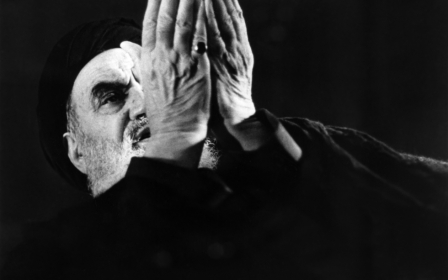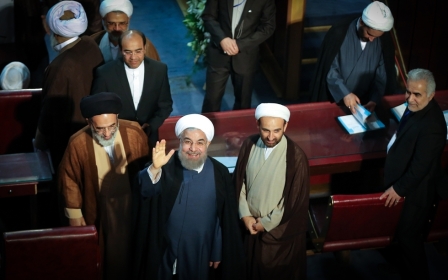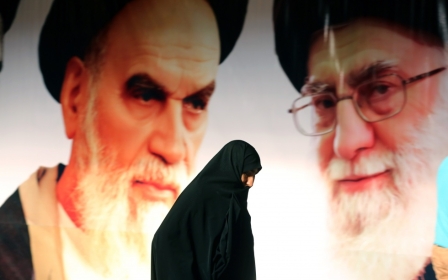US is delaying Iran's return to global economic community

It is a year on Thursday since Iran and the West struck their historic nuclear deal. It is in deep trouble - and the fault lies with the United States.
Iran promised to cut back its peaceful nuclear programme. In return Washington undertook to relax its sanctions against Iran and open the way for its return to the global economic community.
This agreement, reached in Vienna on 14 July 2015, appeared to bring an end to nearly 40 years of cold war between Iran and the West stretching back to the 1979 Islamic revolution.
Since then Iran has cut back its nuclear programme as required, notably by reducing its capacity to enrich uranium and by redesigning its nuclear reactor at Arak.
Iran is also cooperating well with International Atomic Energy Agency inspectors, to whom it has granted unprecedented access, and is honouring its Nuclear Non-Proliferation Treaty commitment to refrain from acquiring nuclear weapons.
Meanwhile the US is doing its best to undermine the deal. Last week Congress wrecked plans for the $25 billion deal to sell 100 Boeing planes to Iran.
US sanctions are inhibiting the development of European trade with Iran. Meanwhile the US Congress is making it impossible for Iran to access its overseas oil revenues worth tens of billions of dollars.
Iranian foreign currency deposits total at least $50bn. Iranians were hoping for the rapid retrieval of these funds to boost a domestic economy that underwent four years of enforced austerity as a result of US and EU nuclear-related sanctions.
They have been disappointed. Most of these deposits are in countries that depend on the dollar as a medium of exchange for their local currency. Their holdings of major foreign currencies other than the dollar, e.g. the euro or yen, are too small for banks in these countries to be able to convert Iranian local currency deposits into those currencies without passing through the dollar.
The Obama administration proposed to solve this problem by an executive decision that would permit conversion of Iranian deposits via the dollar. Iranian money would be in dollar form for a fleeting instant on its way to a euro incarnation, for example.
Word of the administration’s intention leaked to Congress. Opponents of the deal (the Joint Comprehensive Plan of Action agreed in Vienna last July) raised a hue and cry.
The administration’s resolve failed. Treasury Secretary Jacob Lew declared on 11 April that the US would keep its part of the bargain of providing sanctions relief to Iran in return for curbs on its nuclear programme - but that the Obama administration would not allow even limited access to the US financial system.
This failure, together with a failure to devise some form of immunity from fines for European banks, threatens the deal.
It denies Iranians many of the benefits they were promised last year. We believe that the US is in breach of its JCPOA commitment to lift all national sanctions related to Iran’s nuclear programme, “including steps on access in areas of trade, technology, finance and energy”.
Crucially, the nuclear deal required the American government to lift sanctions designed to coerce Iran into abandoning uranium enrichment and completion of the reactor at Arak.
It did not require the lifting of sanctions that target Iranian Revolutionary Guards and others suspected of support for terrorism or human rights abuses. It is these sanctions that resulted in several major European banks incurring billion-dollar fines in recent years.
Understandably these and other European banks are reluctant to run the risk of incurring further such fines.
Secretary of State John Kerry and US Treasury officials say that European banks have nothing to fear as long as they hire lawyers to advise them on the intricate details of US sanctions, and provided they perform due diligence on potential Iranian counterparts.
That advice leaves out of account the complexity and opaque nature of ownership structures in Iran, as well as the expected level of due diligence required by the US government. Without proper guidance, this has led banks to fear inadvertent transgression of US law and to hold back.
Also restraining them is uncertainty as to whether a President Trump or a President Clinton will want to preserve the deal. Trump has said he will want to renegotiate it. Clinton has shown sympathy for pro-Israeli opponents of the deal on many occasions.
Equally uncertain is whether this November’s elections to Congress will result in a decline or an increase in Congressional opposition to the deal.
These factors add up to a risk of fresh US sanctions on Iran in 2017. Sanctions cannot be retroactive but they could require European banks to withdraw once more from the Iranian market. This has been an added reason for the banks to hold back.
Some smaller European banks have been less affected by this extra-territorial intimidation. They are less vulnerable to US fines because they do not have US operations. They, however, lack the means to finance big transactions such as the purchase of Airbus aircraft and developments in Iran’s infrastructure.
It is these transactions that the moderate government of President Hassan Rouhani anticipated when it offered limitations on its sovereign right to a peaceful nuclear programme in exchange for economic benefits.
The fact that so far few of those benefits show any sign of materialising is a boon to Rouhani’s political opponents, who are as opposed to the deal as Republicans and neo-conservatives in the US.
Compounding these threats to the nuclear deal, the Obama administration has done nothing to counter the prevailing American notion that the Islamic Republic of Iran is a revolutionary rogue regime, with which normal relations cannot be contemplated.
Negotiating the deal required US Secretary of State John Kerry to spend many hours in the company of Iranian Foreign Minister Javad Zarif and to familiarise himself with the defensive nature of Iranian foreign policy since the decade that followed the 1979 revolution.
This could have led Obama and Kerry to assure the American people that Iran is now a state with which normal business can be done.
Iranian behaviour continued to cause concern, but so has the behaviour of many other states with which the US conducts normal relations. Normal relations would give the US an opportunity to influence future Iranian behaviour and, crucially, to encourage a prudent use of nuclear technology when restrictions imposed as part of the nuclear deal lapse. In moving to a normal relationship the US would merely be taking a path travelled by its European allies.
Instead, the Obama administration sold the deal as a measure which would impose on Iran a regime of nuclear restrictions and inspections that close all conceivable pathways to a nuclear weapon, and which would not require any closer US-Iran relations.
Since then, the Obama administration has failed to refute Congressional opponents of the JCPOA who want to exploit Iranian missile tests to justify further sanctions. The possession of nuclear weapons is outlawed by the NPT, the possession of chemical weapons by the Chemical Weapons Convention.
But there is no global prohibition on the possession, or testing, of missiles. Nor is Iran subject to any ad hoc Security Council prohibition. None of this has been made clear to Congress or the American public.
Much the same can be said about Iranian sponsorship of terrorism. The US State Department published on 2 June its annual assessment of global terrorist activity. It finds that in 2015 Iran remained the world’s leading state sponsor of terrorism.
To justify that finding the author characterises Iranian support for Syrian government operations in Syria, through the Quds Force and Lebanese Hezbollah, as support for terrorist activity.
Even more absurdly, Iranian support for Iraqi pro-government Shia groups involved in the counter-offensive against Islamic State group receives the same treatment.
This grotesque misrepresentation of Iranian support for the governments of Syria and Iraq will be grist for the mill of Congressional opponents of the nuclear agreement. It will do nothing to moderate American perceptions of Iran.
Obama has a right to see the nuclear deal as an achievement. It resolved global concerns about the nature of Iran’s nuclear programme and averted the risk of a costly war in the Gulf. Yet he has done nothing to create conditions conducive to its survival after he leaves office. This has the potential to be a disastrous omission.
The deal has brutal and ruthless opponents both in the United States and in Iran. Already, working through Congress, they have taken significant steps towards reducing the benefits of the deal in Tehran. That in turn has done great damage to the standing of Rouhani. The hardliners on both sides are gaining confidence, and may yet wreck the deal and all hope of reconciliation between Iran and the West.
- Peter Jenkins is a former British ambassador to the international Atomic Energy Agency (IAEA).
- Peter Oborne was named freelancer of the year 2016 by the Online Media Awards for a report he wrote for Middle East Eye. He was British Press Awards Columnist of the Year 2013. He resigned as chief political columnist of the Daily Telegraph in 2015. His books include The Triumph of the Political Class, The Rise of Political Lying, and Why the West is Wrong about Nuclear Iran.
The views expressed in this article belong to the authors and do not necessarily reflect the editorial policy of Middle East Eye.
Photo: US Secretary of State John Kerry and his Iranian counterpart Mohammad Javad Zarif meeting in Vienna in January, 2016 (AFP).
New MEE newsletter: Jerusalem Dispatch
Sign up to get the latest insights and analysis on Israel-Palestine, alongside Turkey Unpacked and other MEE newsletters
Middle East Eye delivers independent and unrivalled coverage and analysis of the Middle East, North Africa and beyond. To learn more about republishing this content and the associated fees, please fill out this form. More about MEE can be found here.




